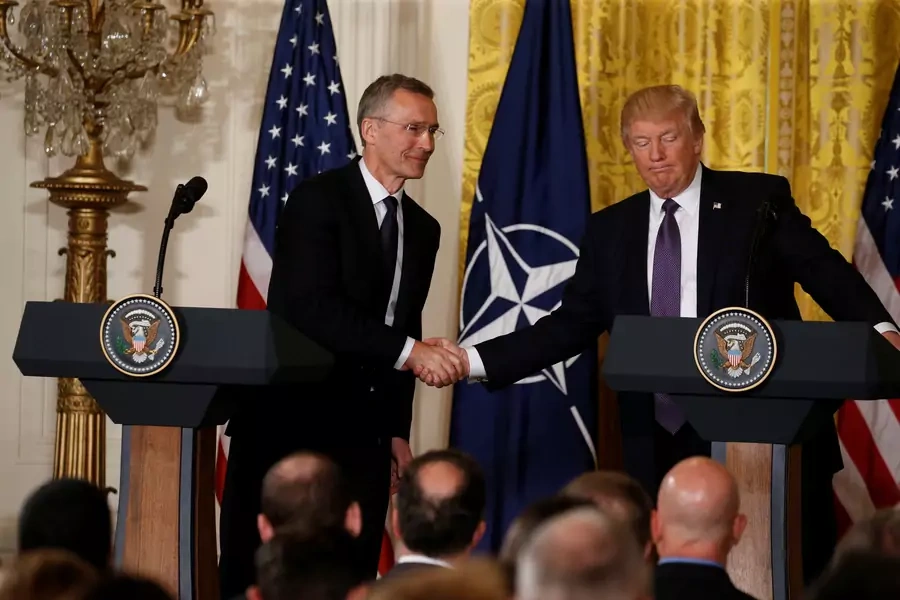Europe’s Insecurity Dilemma

Coauthored with Alex Davidson, intern in the International Institutions and Global Governance program at the Council on Foreign Relations.
The rise of Donald J. Trump to Commander in Chief has unsettled the foundations of transatlantic security, casting doubts on the credibility of U.S. commitment to the North Atlantic Treaty Organization (NATO). President Trump has repeatedly criticized NATO member states for their chronic underfunding of the alliance, and even presented the possibility of U.S. withdrawal, only to belatedly pledge to defend Western civilization and endorse NATO Article 5.
More on:
Trump’s indecision was evident at this year’s NATO and G7 meetings, where he was also at odds with his European counterparts on issues ranging from trade to climate change. European leaders remain unnerved, wondering whether the United States will end or reduce its security commitments. This uncertainty is damaging to the alliance, which relies above all on trust among its members. At stake is the cohesion and effectiveness of NATO, and the security of both Europe and United States.
NATO’s strength is its unity. Article 5 of the North Atlantic Treaty, which commits all members to come to the aid of the others if one or more is attacked, is the core of the collective defense arrangement and a deterrent against external aggression. Trump’s noncommittal attitude toward NATO member states—particularly his relative reticence on Article 5—comes at a dangerous time. Russia presents the most immediate challenge. Putin, seeking to weaken the alliance and expand his country’s regional influence, could well expand Russia’s information operations, as alleged in the U.S. election and Montenegro. Or it could adopt even more provocative measures, covertly fomenting instability within the Baltic States, using similar tactics as in Ukraine in 2014. Ambiguity about U.S. intentions and the scope of U.S. commitments could risk a repeat of the disastrous U.S. policy just before the beginning of the Korean War, when vague American signals contributed to Chinese and North Korean miscalculation.
Either scenario would endanger European security and place the United States in a precarious situation where both action and inaction could yield dire consequences. The United States might be drawn into violent conflict, either directly or by proxy, with a nuclear-armed adversary. Alternatively, failure to respond would leave Russia emboldened to expand its influence in Eastern Europe. To avoid this scenario, President Trump must remove any doubt surrounding the U.S. commitment to NATO—and to Europe whole and free.
If President Trump cannot be trusted to honor commitments that have been in place for nearly seventy years, the credibility of his already suspect foreign policy will evaporate. It will demonstrate that “America First” means America alone, just as his repudiation of the Paris Climate Accords hinted.
Unless the president reverses course, Europe could have no choice but to assume entire responsibility for its own security. Germany and France, which together contribute over 25 percent of NATO’s budget, would almost certainly form the backbone of any new arrangement. Already, German Chancellor Angela Merkel has stated that Europe cannot count on the United States—and that Germany will work with France to maintain European security. Clearing the way for intra-European security cooperation, a German court ruled last month that Germany could legally fund British and French nuclear programs in exchange for their protection. Indeed, it ruled that nuclear weapons from either country could be placed on German soil.
More on:
There is something to be said, of course, for Europeans standing on their own feet. But it is unclear that European powers are capable, in the short or medium term, of meeting the enormous security gap left by a potential U.S. withdrawal. France and Germany, as well as the United Kingdom, would likely be called upon to fill the vacuum. Given their already substantial contributions, it is unlikely they would be capable of replacing the loss of the U.S. military capabilities, including both personnel and weaponry currently stationed in Europe. The Europeans would also need to consider their nuclear posture, given the potential removal of U.S. nuclear weapons stationed on the continent—or even the removal of the U.S. nuclear umbrella, which has played an invaluable role in deterring would-be aggressors.
Readjusting the balance of power, privilege, and responsibility within NATO will be an arduous exercise. Since its inception, NATO has been led by Supreme Allied Commander—always an American. If the United States reduces its NATO profile, that will change. The “America First” era also complicates NATO’s strategic doctrine, as growing U.S. retrenchment naturally leads threat perceptions to diverge between the United States and its European allies—and among the twenty-seven European members of NATO. Already, the plurality of threats facing the transatlantic world is complicating agreement on how to allocate and focus the alliance’s scarce resources. Europe finds itself contending with Russia’s growing assertiveness, growing cyber-threats, large-scale refugees flows, and an explosion of terrorism, much of it home-grown.
The task of bolstering European security is further complicated by ongoing Brexit negotiations, as the United Kingdom looks to distance itself from the continent. Maintaining the United Kingdom as a partner in European security is imperative, since it boasts one of Europe’s largest militaries and possesses one of its two nuclear arsenals.
Given these realities, Europe urgently needs the United States to reaffirm its NATO obligations, even as European states must begin to wean themselves off of unhealthy dependence on the United States. Given the turmoil that has engulfed Europe in recent years, the last thing the continent needs is ambiguity about Washington’s commitment to NATO. President Trump’s unnerving assaults on the alliance has thrown its credibility into doubt and risks poisoning the long-standing, friendly relations the United States has long enjoyed with its most important allies.
 Online Store
Online Store